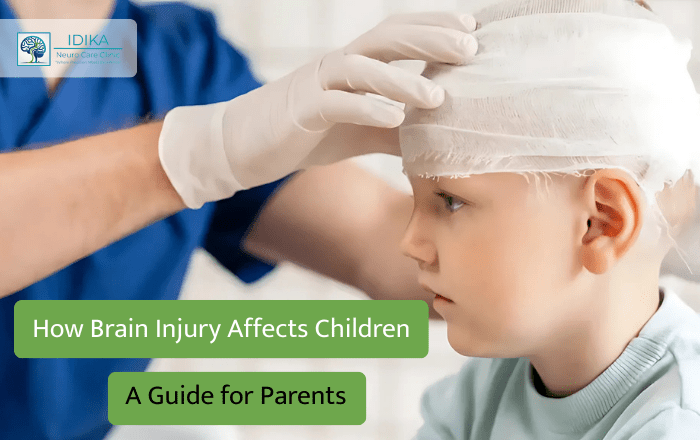When your child takes a tumble or hits their head, it’s natural to feel worried. Most of the time, it’s nothing serious. But sometimes, a bump on the head can lead to something more. Brain injuries in children may not always show obvious signs right away, which is why it’s so important for parents to know what to look for.
In this blog, we’ll explore how brain injuries affect kids, what symptoms to watch for, how it can impact their development, and what you can do to help. Whether you’re a new parent or have older children, this guide is here to offer support, understanding, and helpful steps you can take.
What Is a Brain Injury in Children?
A pediatric brain injury happens when a child’s brain is hurt by a sudden force or illness. These injuries can be:
- Traumatic – caused by external events like falls, car accidents, or sports injuries.
- Non-traumatic – caused by things like infections, lack of oxygen, or brain tumors.
Children’s brains are still developing, which means they can be more sensitive to injuries. A brain injury can affect how they think, move, behave, or learn.
Signs and Symptoms Parents Should Watch For
Recognizing the symptoms early can make a big difference. Sometimes signs appear right after the injury, but other times, they show up days or even weeks later.
Common signs of brain injury in children include:
- Headaches or dizziness
- Vomiting or nausea
- Changes in sleep (sleeping too much or too little)
- Trouble focusing or remembering things
- Mood swings or irritability
- Loss of interest in play or school
- Seizures (in more serious cases)
For infants and toddlers, symptoms might include:
- Crying more than usual
- Trouble feeding
- Unusual drowsiness
- Bulging soft spot on the head
If you notice these changes after a head injury—or even without a clear cause—it’s best to speak with a doctor.
How Brain Injuries Affect Child Development
Every child is different, and so are the effects of a brain injury. Some children may recover quickly, while others might take longer or need extra support.
Here’s how a brain injury might affect your child’s development:
1. Cognitive (Thinking and Learning)
- Trouble with attention or memory
- Slower thinking or problem-solving
- Difficulty with reading, writing, or math
2. Communication and Speech
- Delayed speech
- Trouble understanding or using language
- Difficulty following instructions
3. Emotional and Social Behavior
- Mood changes or anxiety
- Struggles with friendships
- Frustration or anger more easily
4. Physical Abilities
- Weakness in arms or legs
- Problems with balance or coordination
- Tiredness or low energy
Diagnosis and Treatment Options
Doctors use several tools to check for brain injuries. This may include:
- Physical exams
- Asking about symptoms and behavior changes
- Imaging tests like MRI or CT scans to look at the brain
Treatment depends on how serious the injury is. A child might need rest, medication, or therapy to help with speech, movement, or learning. The sooner the child gets the right help, the better their chances of improvement.
Preventing Brain Injuries in Children
You can’t prevent every fall or accident, but there are simple ways to reduce the risk of brain injuries:
- Always use helmets when biking, skating, or riding in a child seat
- Use safety gates near stairs and windows
- Never leave young children unattended on high surfaces like beds or couches
- Use car seats properly and follow safety guidelines
- Teach older kids about safe play, especially during sports
By creating safe habits early, you help protect your child from serious harm.
FAQ: Common Questions from Parents
1. Will my child have learning problems after a brain injury?
Some children may face challenges with memory or concentration. Schools can provide special support if needed.
2. Where should I take my child after a head injury?
If your child has signs of brain injury, take them to a pediatrician or emergency room. For ongoing concerns, see a child neurosurgeon. In Thane, parents can consult Dr. Harshal Agrawal at MRR Children’s Hospital for expert guidance.
3. Should I see a specialist even if symptoms seem mild?
Yes. Even small changes after a head injury can be signs of something more. A specialist can help rule out serious issues.
Need a Pediatric Neurosurgeon in Thane?
You can consult Dr. Harshal Agrawal, a trusted Child Neurosurgeon in Thane, available at MRR Children’s Hospital. He works with families to understand what their child is going through and offers clear guidance for the next steps.

